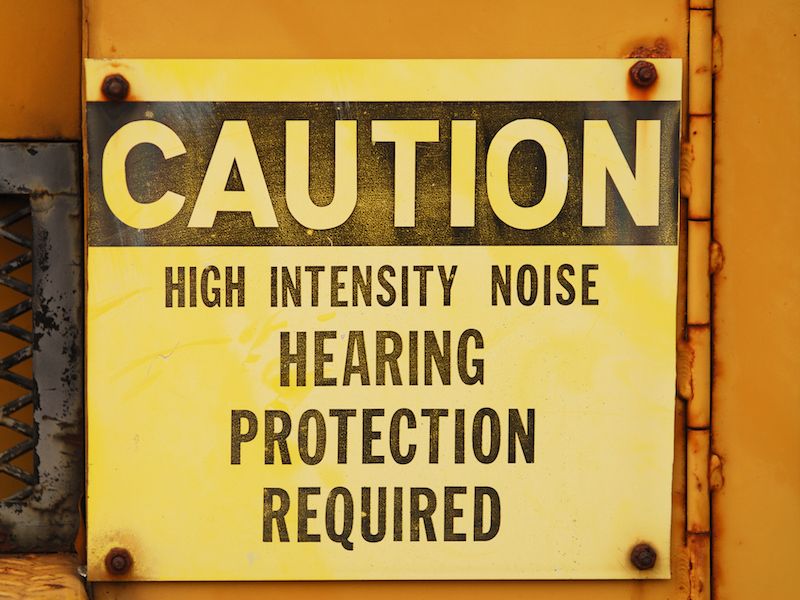
Understanding you need to safeguard your hearing is one thing. It’s a different story to know when to safeguard your ears. It’s not as easy as, for example, determining when to use sunblock. (Are you going to go outside? Is the sun out? You need to be wearing sunblock.) Even recognizing when you need eye protection is simpler (Working with hazardous chemicals? Doing some construction? You need eye protection).
With regards to when to wear hearing protection, there seems to be a huge grey area which can be dangerous. Frequently, we’ll defer to our normal inclination to avoid hearing protection unless we’re given information that a particular activity or place is dangerous.
Risk Evaluations
In general, we’re not very good at assessing risk, especially when it comes to something as intangible as injury to the ears or the possibility of lasting sensorineural hearing loss. To prove the point, here are some examples:
- Person A goes to a very loud rock concert. The concert lasts roughly 3 hours.
- A landscaping company is run by person B. After mowing lawns all day, she goes home and quietly reads a book.
- Person C is an office worker.
You may think the hearing hazard is higher for person A (let’s just call her Ann). Ann leaves the performance with ringing ears, and she’ll spend most of the next day, trying to hear herself talk. Assuming Ann’s activity was hazardous to her ears would be reasonable.
The noise that person B (let’s just call her Betty), is exposed to is not as loud. Her ears don’t ring. So her ears must be less hazardous, right? Not really. Because Betty is riding that mower all day. So even though her ears never ring out with pain, the injury builds up bit by bit. If experienced too often, even moderately loud sounds can have a damaging effect on your ears.
Person C (let’s call her Chris) is even less evident. Lawnmowers come with instructions that indicate the risks of continued exposure to noise. But even though Chris has a relatively quiet job, her long morning commute on the train every day is rather loud. Additionally, even though she works at her desk all day, she listens to her music through earbuds. Does she need to think about protection?
When is it Time to Start to Consider About Protecting Your Hearing?
The general guideline is that if you need to raise your voice in order to be heard, your surroundings are loud enough to do damage to your ears. And if your environment is that noisy, you need to consider wearing earplugs or earmuffs.
So to put this a bit more scientifically, you need to use 85dB as your limit. Noises above 85dB have the ability to result in damage over time, so you should consider using ear protection in those circumstances.
Your ears don’t have their own decibel meter to alert you when you get to that 85dB level, so most hearing professionals recommend getting specialized apps for your phone. You will be capable of taking the required steps to safeguard your hearing because these apps will inform you when the sound is getting to a harmful level.
A Few Examples
Even if you do get that app and take it with you, your phone might not be with you everywhere you go. So a few examples of when to protect your ears may help you formulate a good standard. Here we go:
- Listening to music with earbuds. This one requires caution, more than protection. Pay attention to how loud the music is, how long you’re playing it, and whether it’s going directly into your ears. Noise-canceling headphones are a good choice to prevent needing to turn the volume way up.
- Commuting and Driving: Driving all day as an Uber or Lyft driver? Or maybe you’re just hanging around downtown for work or boarding the subway. The constant noise of living in the city, when experienced for 6-8 hours a day, can cause damage to your hearing over the long term, specifically if you’re turning up your music to hear it over the commotion.
- Exercise: Your morning cycling class is a good example. Or perhaps your daily elliptical session. You may think about using hearing protection for each one. Those instructors who use sound systems and microphones (and loud music) to motivate you may be good for your heart rate, but all that volume is bad for your ears.
- Domestic Chores: We already mentioned how something as simple as mowing the lawn, when done frequently, can call for hearing protection. Chores, including mowing, are probably something you don’t even think about, but they can cause hearing damage.
- Operating Power Tools: You know that working all day at your factory job will require ear protection. But what if you’re just puttering around your garage all day? Most hearing professionals will recommend you use hearing protection when using power tools, even if it’s just on a hobbyist basis.
A strong baseline might be established by these examples. If there is any doubt, though, wear protection. Instead of leaving your ears exposed to future harm, in most cases, it’s better to protect your ears. Protect today, hear tomorrow.